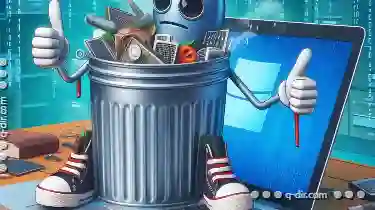Operating systems like Windows and Linux are becoming increasingly popular as they offer flexibility, advanced features, and great user interfaces. ...
 However, dual-booting these operating systems can sometimes lead to issues related to file management, especially when it comes to deleting files from different partitions or drives. This blog post will discuss the best practices for deleting files in a dual-boot system setup, focusing on Windows and Linux environments.
However, dual-booting these operating systems can sometimes lead to issues related to file management, especially when it comes to deleting files from different partitions or drives. This blog post will discuss the best practices for deleting files in a dual-boot system setup, focusing on Windows and Linux environments.1. Sub-points:
1.) Sub-points:
1. Understanding Your Dual-Boot Configuration
Before diving into file deletion, it's crucial to understand how your computer is configured with two operating systems. Typically, you will have separate partitions for each OS or even different drives if space constraints are an issue. This setup means that files stored in one partition/drive won’t be directly accessible from the other partition/drive without proper handling.
2. Accessing Files Across Dual-Boot Systems
If you want to delete a file located on another operating system's partition or drive, you will need to access it through that OS. For example:
- Accessing Linux Files from Windows: You can use tools like Ubuntu’s "Startup Disk Creator" which allows you to boot into a live session of Ubuntu and navigate your hard drives. Alternatively, you can use third-party software or virtualization tools like VirtualBox to run a Linux virtual machine where you can delete the file directly.
- Accessing Windows Files from Linux: You might need to boot into a Windows installation disk or restart into Windows via GRUB (the bootloader for Linux), then navigate and delete the files as usual in Windows.
3. Using Command Lines for Efficient File Deletion
For advanced users, command lines can be incredibly useful when dealing with dual-boot systems:
- Deleting Files from Linux: You can use terminal commands like `rm` or `sudo rm -rf` (be very careful with this as it will permanently delete the file) to delete files in Linux. Ensure you navigate correctly within the filesystem, especially if accessing Windows partitions.
- Deleting Files from Windows via Command Line: PowerShell provides powerful command line tools for file management. However, these are less common and might require more advanced knowledge of using command lines in Windows.
4. Safeguarding Your Data: Backup Before Deletion
It's a fundamental rule to always have backups before making any significant changes or deletions in your computing environment, especially when dealing with dual-boot systems. Always ensure that important data is securely backed up before proceeding with file deletion:
- Automated Cloud Backups: Consider using cloud services for automated backups of both operating systems’ partitions/drives to protect against accidental deletions or system crashes.
- Manual Local Backups: Regularly create manual backups on external hard drives, network drives, or cloud storage platforms like Dropbox or Google Drive.
5. Understanding the Risks and Consequences of Deleting Files
Deleting files in dual-boot systems can lead to data loss if not handled correctly:
- Unrecoverable Data Loss: Accidental deletions can result in permanent loss of important documents, photos, videos, or other files. Always double-check paths and use backup strategies as a safeguard.
- System Stability Issues: Incorrect file deletion commands might affect the system’s stability or functionality, especially if you delete critical OS components without proper knowledge.
6. Permissions and Security in Dual-Boot Systems
When dealing with different partitions for Windows and Linux, permissions can become an issue:
- Linux File Permissions: Be mindful of file permissions when accessing files from Windows partition under Linux. You might need to adjust permissions depending on the file type or usage.
- Windows Access Rights: In Linux, you cannot change access rights (like NTFS) for files in a Windows partition directly; however, you can always boot into Windows and manage these settings through the File Explorer.
7. Regular Maintenance: Checking Disk Health
Regularly check your disk health to ensure that everything is functioning correctly:
- Disk Utility: Use tools provided by both Windows (such as File History in older versions of Windows) and Linux (like `fsck` in Ubuntu) to scan for errors or bad sectors which could indicate potential issues with file integrity.
8. Updating Your Knowledge on Dual-Boot Management
As technology evolves, so should your knowledge:
- Educational Resources: Regularly read guides, watch tutorials, and participate in forums related to dual-boot management to stay updated about best practices, new tools, and how to address potential problems effectively.
Conclusion
Deleting files across different partitions of a dual-boot system can be tricky but with the right approach and knowledge, it’s entirely manageable. Always ensure you understand your setup, always backup important data, and use caution when navigating file systems in a multi-OS environment. With this guide as a reference, managing your digital assets should become smoother and more efficient.

The Autor: / 0 2025-06-13
Read also!
Page-

Is the Favorites List a Security Vulnerability in Disguise?
Where data security is of paramount importance, it's crucial to question whether our favorite features and shortcuts could be compromising our ...read more

Columns: A Gateway to Advanced Digital Analytics
This blog post delves into the various aspects of columns within digital layouts, exploring their impact on user engagement, navigation, and data ...read more

The Myth of "Smart" Filters: Where Our Expectations Are Deceived.
From basic edits to complex post-processing, filters promise to transform photos with a simple click. However, many users, particularly beginners and ...read more